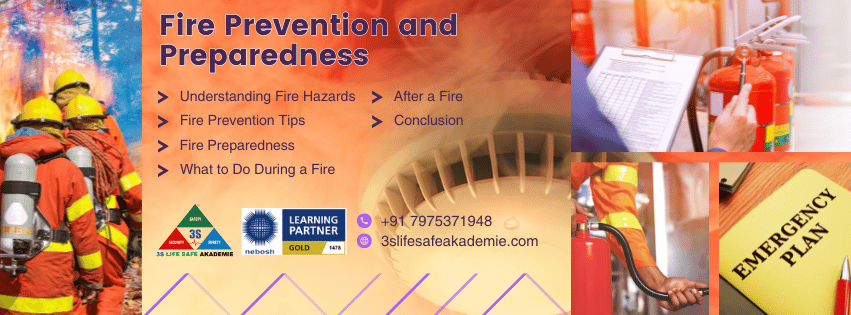Fire is one of the most devastating events that can affect a household. It can happen without warning and can cause significant damage to property, not to mention the potential for loss of life. Fire prevention and preparedness are crucial to ensure the safety of your home and loved ones. This guide will provide comprehensive information on how to prevent fires and how to be prepared in case one occurs.
Understanding Fire Hazards
Fires can start for many reasons, and understanding these hazards is the first step in prevention. Common fire hazards in homes include:
- Electrical faults: Overloaded circuits, faulty wiring, and damaged electrical appliances can spark fires.
- Cooking accidents: Unattended cooking is a leading cause of home fires.
- Heating equipment: Improper use of heaters and fireplaces can result in fires.
- Smoking: Cigarettes and other smoking materials are a common source of fires, especially when not properly extinguished.
- Candles: Leaving candles unattended can lead to a fire.
- Flammable liquids: Improper storage of flammable liquids like gasoline can be a fire risk.
Fire Prevention Tips
Preventing a fire involves being vigilant and taking proactive steps to minimize risks. Here are some essential fire prevention tips:
- Electrical Safety
- Regularly inspect electrical appliances and wiring for damage.
- Avoid overloading electrical outlets.
- Use surge protectors to prevent electrical surges.
- Hire a qualified electrician to check your home's wiring periodically.
- Cooking Safety
- Never leave cooking food unattended.
- Keep flammable items away from the stove.
- Install a smoke detector in the kitchen.
- Keep a fire extinguisher within reach in the kitchen.
- Heating Safety
- Keep flammable objects at least three feet away from heating equipment.
- Regularly clean and inspect chimneys and fireplaces.
- Use space heaters with automatic shut-off features.
- Never use an oven to heat your home.
- Smoking Safety
- Smoke outside whenever possible.
- Use deep, sturdy ashtrays to extinguish cigarettes.
- Never smoke in bed.
- Make sure all smoking materials are completely extinguished before disposal.
- Candle Safety
- Never leave candles unattended.
- Use candle holders that won't tip over easily.
- Keep candles away from flammable materials.
- Consider using flameless candles as a safer alternative.
- Flammable Liquids Safety
- Store flammable liquids in approved containers.
- Keep them in well-ventilated areas away from heat sources.
- Follow manufacturer instructions for storage and disposal.
Fire Preparedness
Even with the best prevention efforts, it's essential to be prepared in case a fire does occur. Here's how you can prepare:
- Install Smoke Alarms
- Place smoke alarms on every level of your home and inside bedrooms.
- Test smoke alarms monthly.
- Replace batteries at least once a year.
- Replace smoke alarms every ten years.
- Create a Fire Escape Plan
- Develop a plan that includes two ways out of every room.
- Practice the escape plan with your family at least twice a year.
- Designate a meeting spot outside your home.
- Teach children how to escape on their own if they need to.
- Prepare a Fire Safety Kit
- Include items like a fire extinguisher, first aid kit, flashlight, and batteries.
- Store the kit in an easily accessible location.
- Make sure all family members know where the kit is located.
- Know How to Use a Fire Extinguisher
- Keep at least one fire extinguisher on each level of your home.
- Ensure everyone in the household knows how to use it.
- Remember the PASS technique: Pull the pin, Aim the nozzle, Squeeze the handle, and Sweep the base of the fire.
What to Do During a Fire
If a fire does break out, knowing what to do can save lives. Follow these steps during a fire:
- Alert Everyone: Yell "Fire!" to alert others in the house.
- Evacuate Immediately: Leave your home immediately using your escape plan.
- Stay Low: Smoke rises, so stay low to avoid inhaling smoke.
- Check Doors: Feel doors with the back of your hand before opening. If the door is hot, use your second way out.
- Do Not Use Elevators: Use stairs instead.
- Call for Help: Once outside, call 911 or your local emergency number.
- Do Not Re-enter: Never go back inside a burning building.
What to Do After a Fire
After a fire, it's essential to take steps to recover safely:
- Wait for Permission: Only re-enter your home when authorities say it's safe.
- Document Damage: Take photos of the damage for insurance purposes.
- Contact Your Insurance: Notify your insurance company to start the claims process.
- Seek Support: Reach out to local disaster relief services for assistance.
- Take Care of Health: Get medical attention if needed and look after your mental health.
Conclusion
Fire prevention and preparedness are critical components of home safety. By understanding common fire hazards, implementing prevention measures, and preparing for emergencies, you can protect your home and loved ones from the devastating effects of fire. Stay vigilant, stay prepared, and stay safe.
